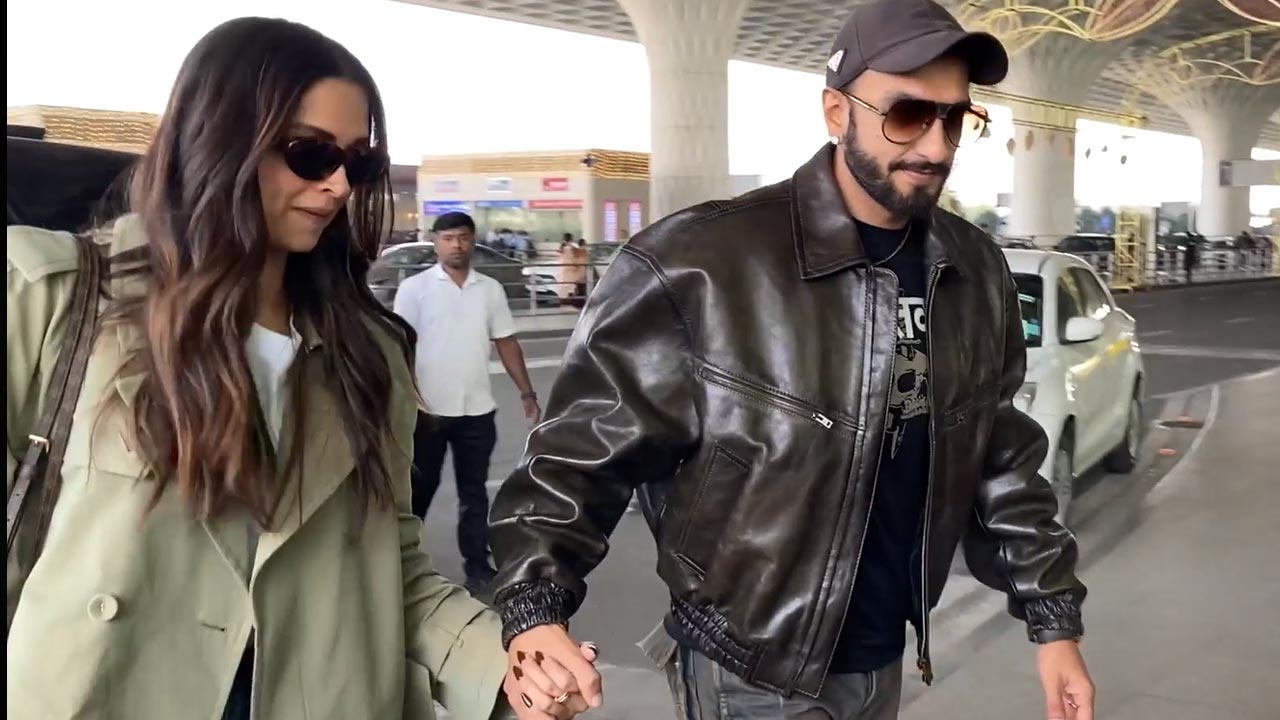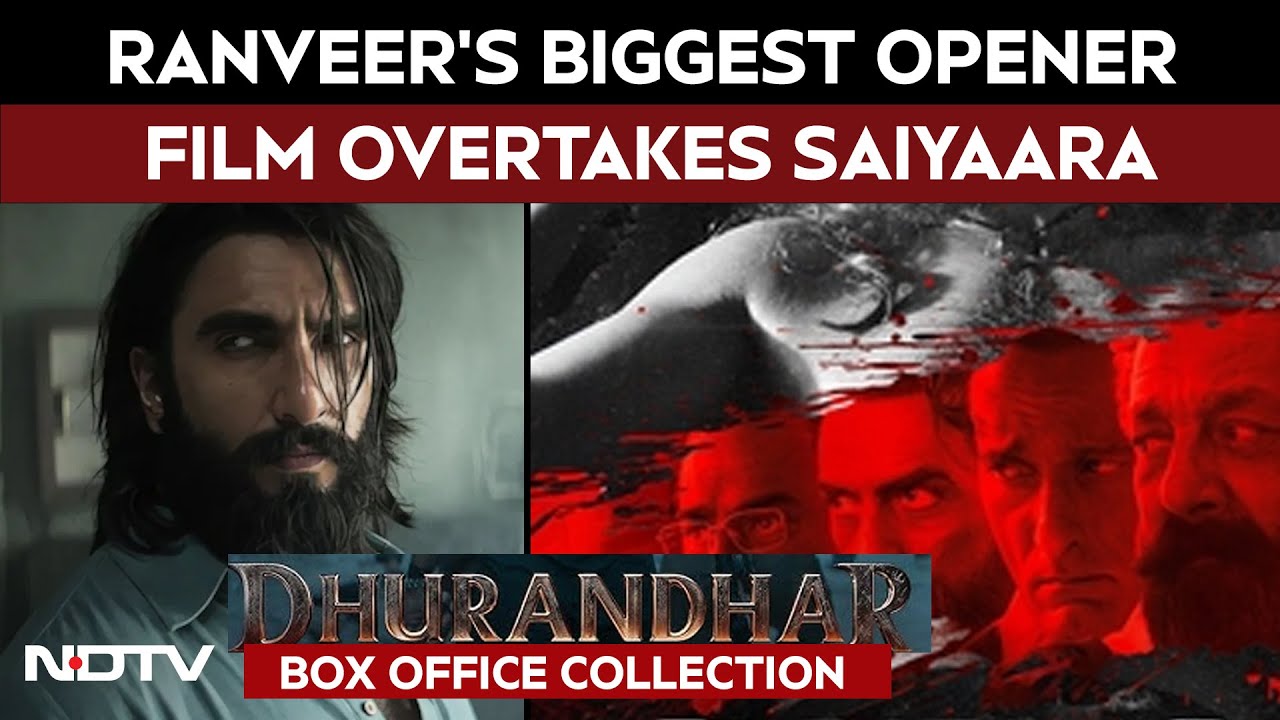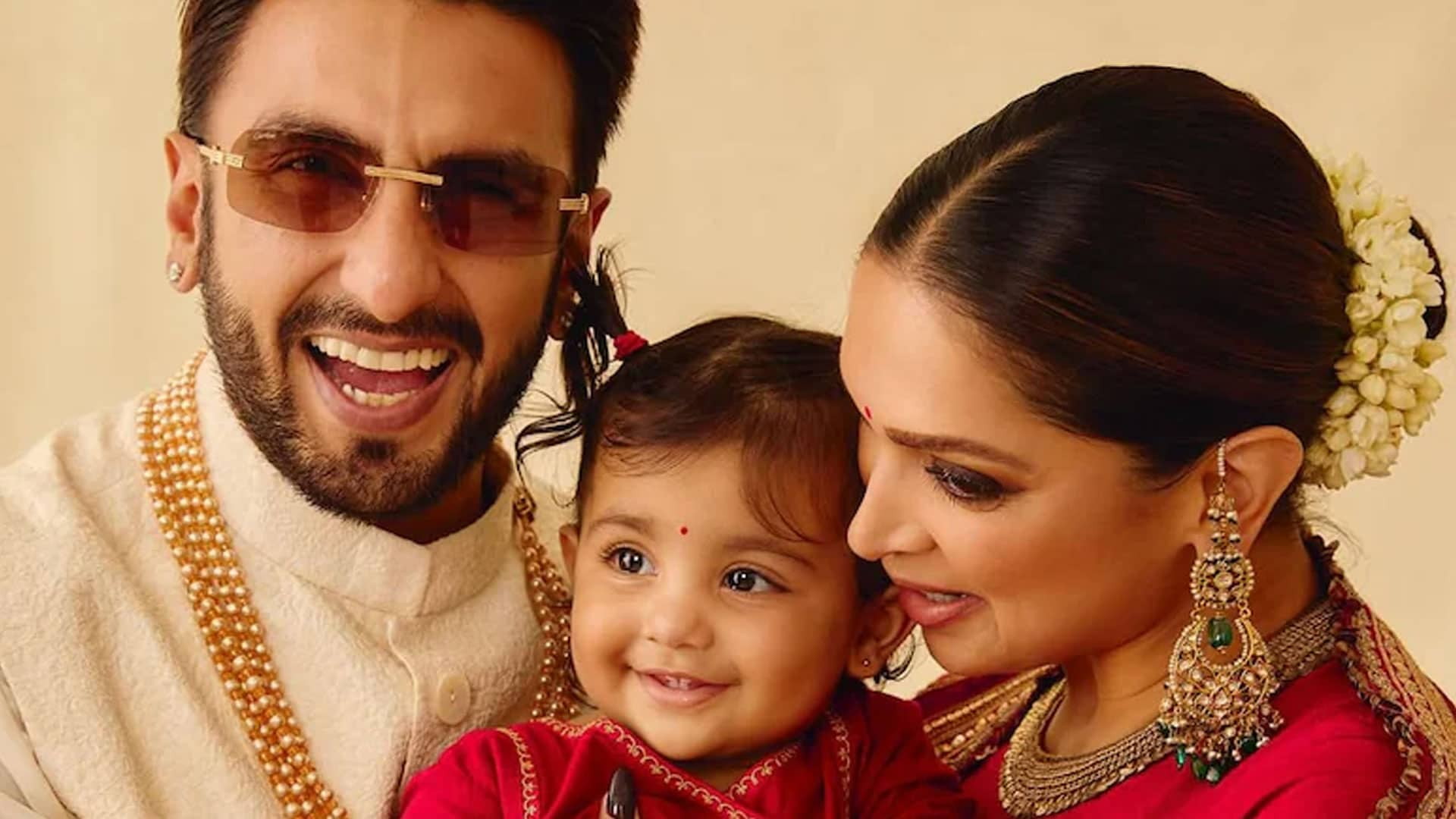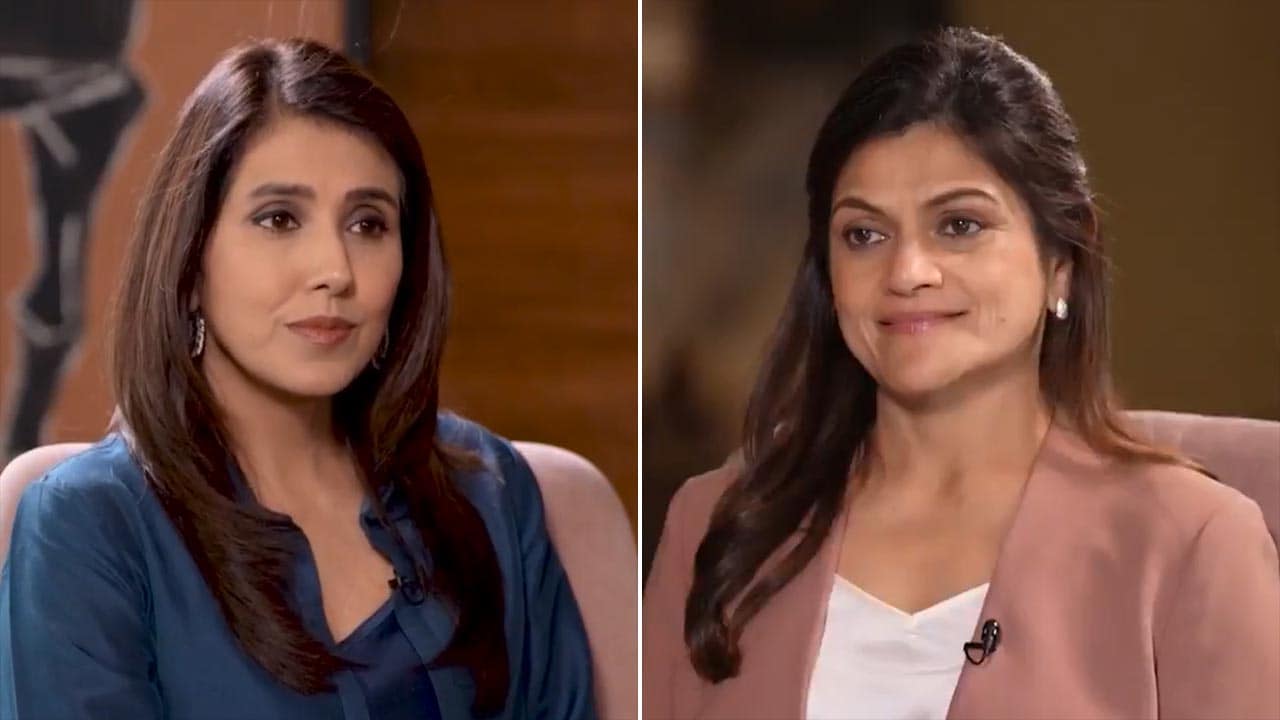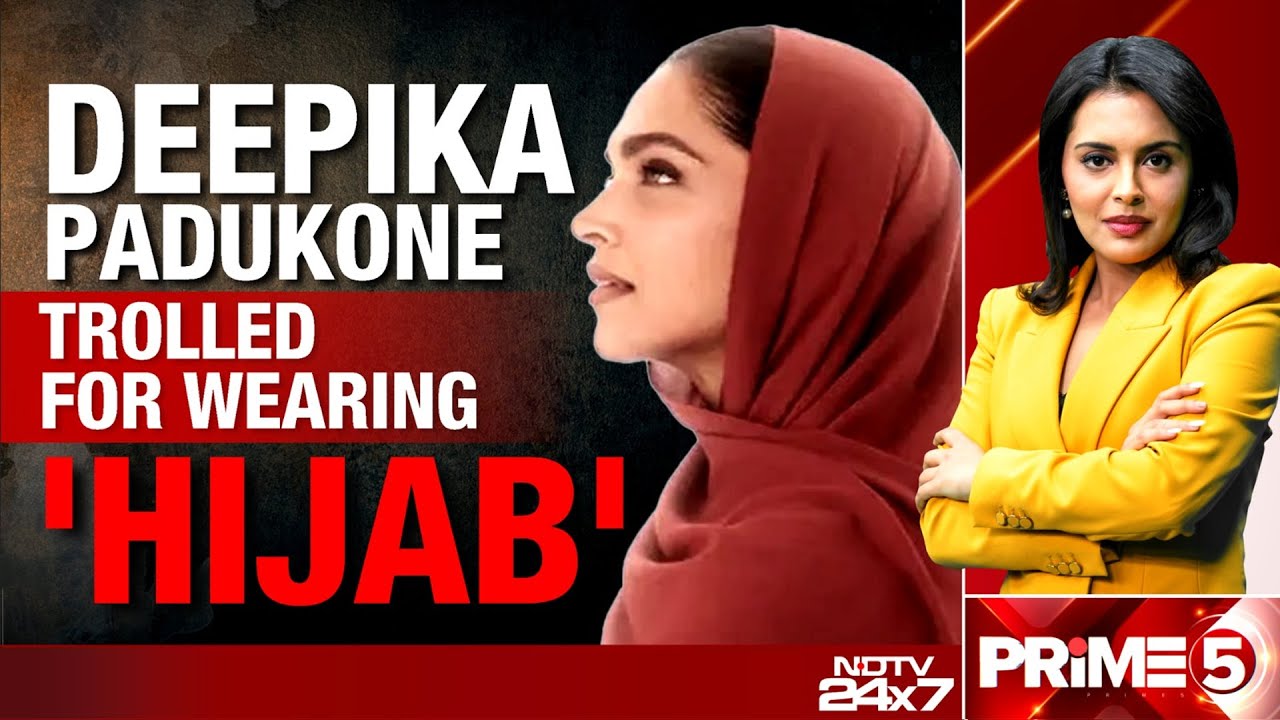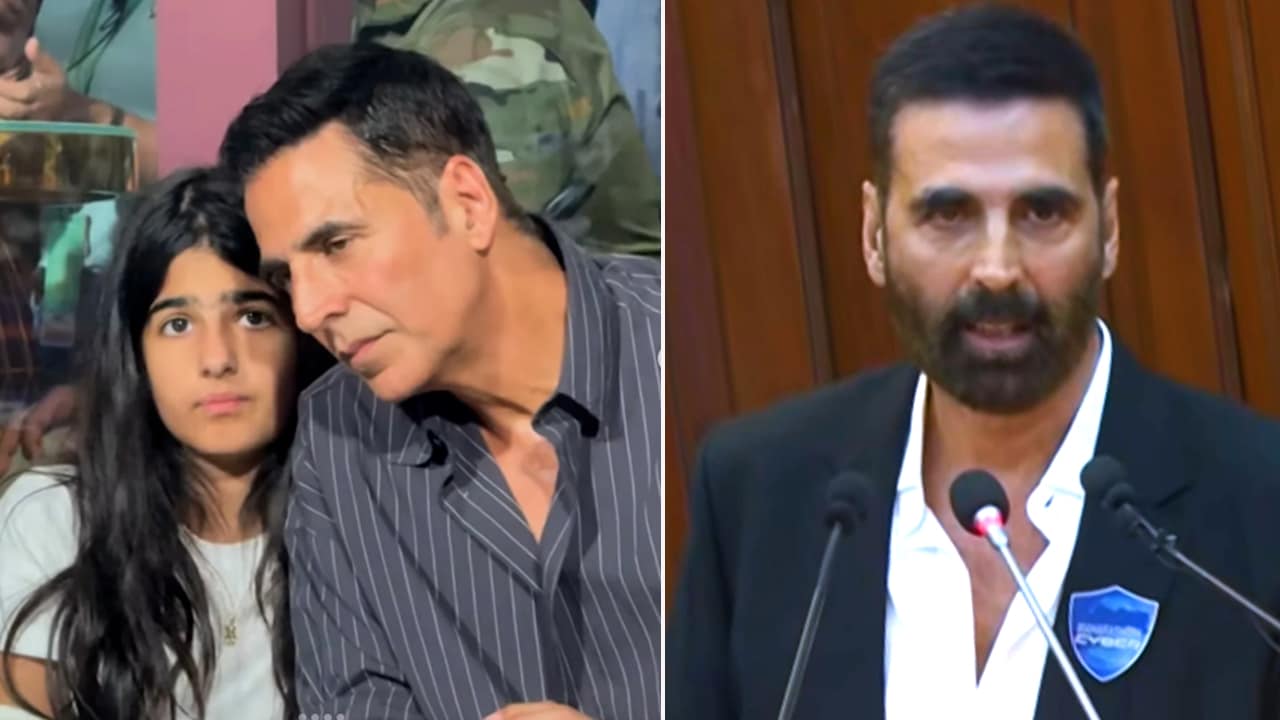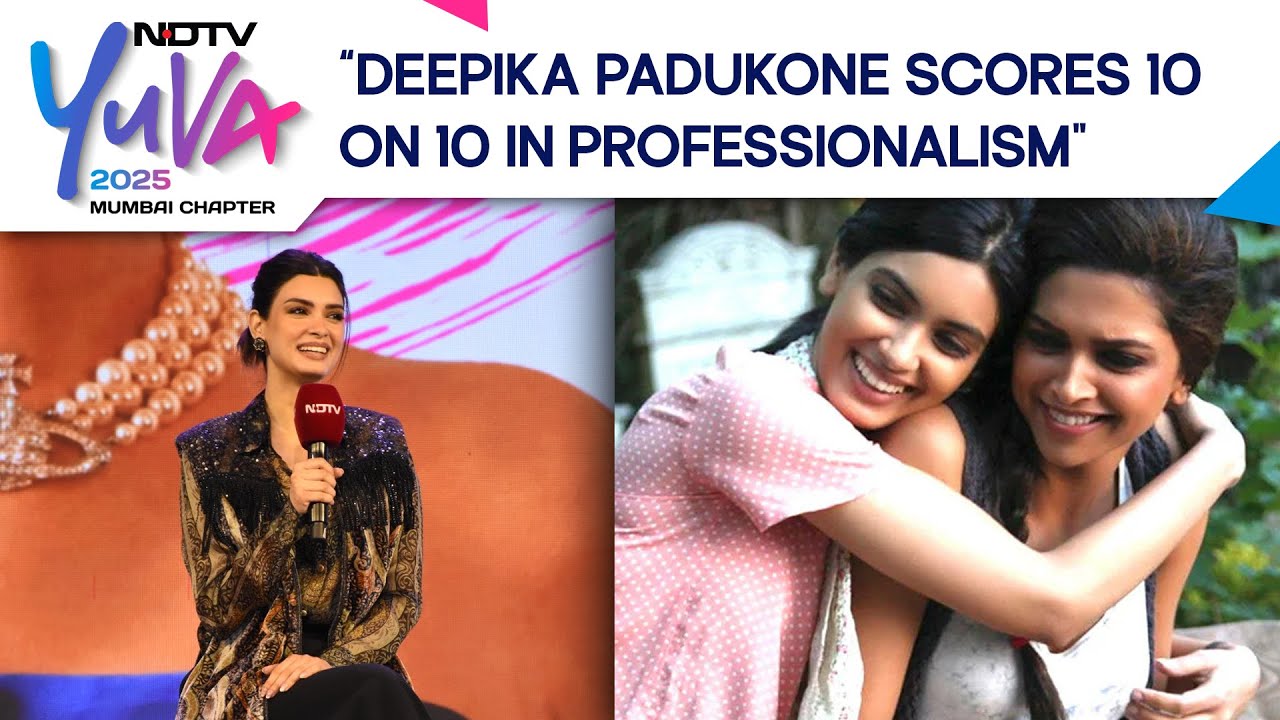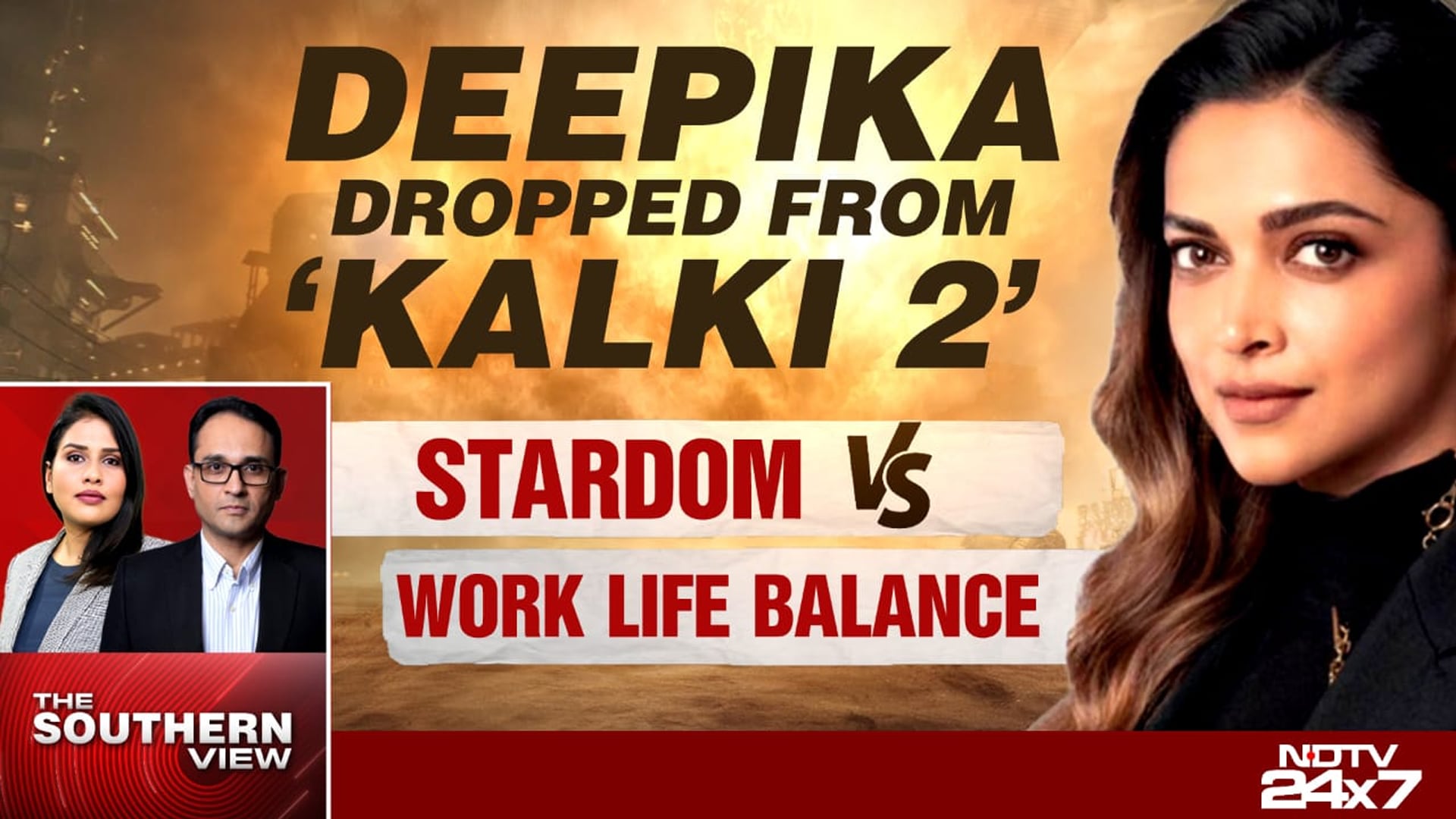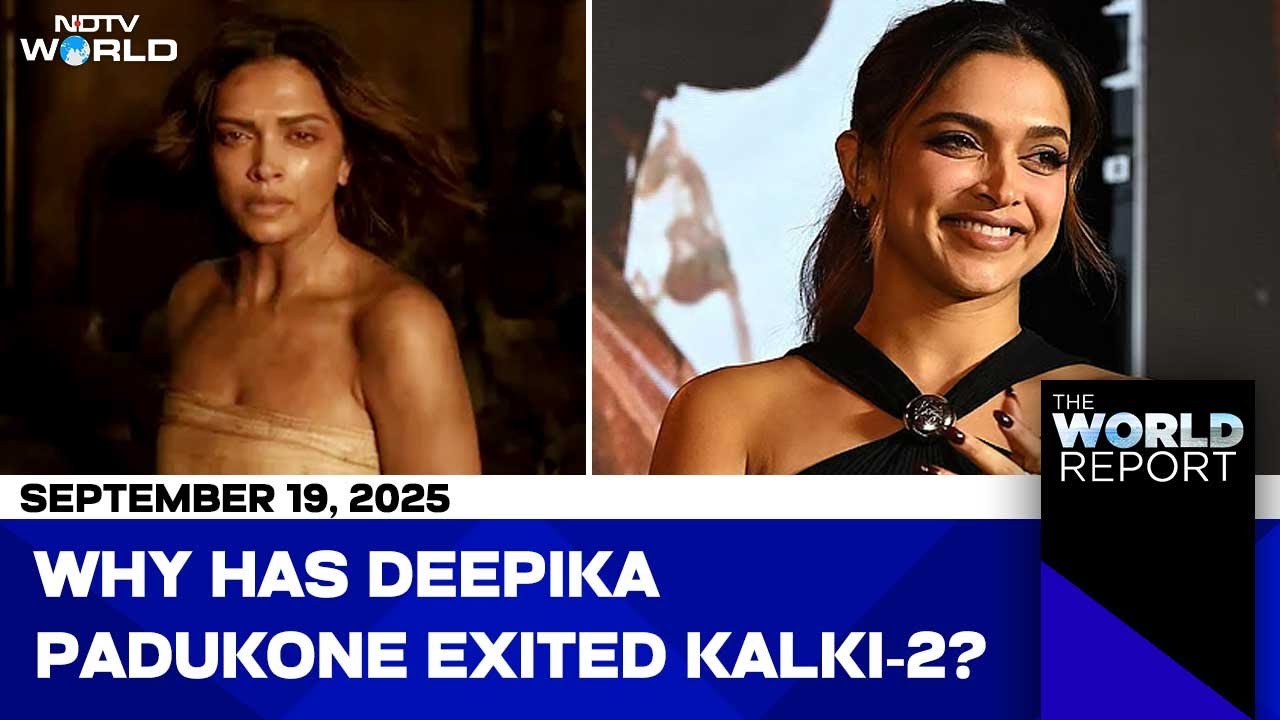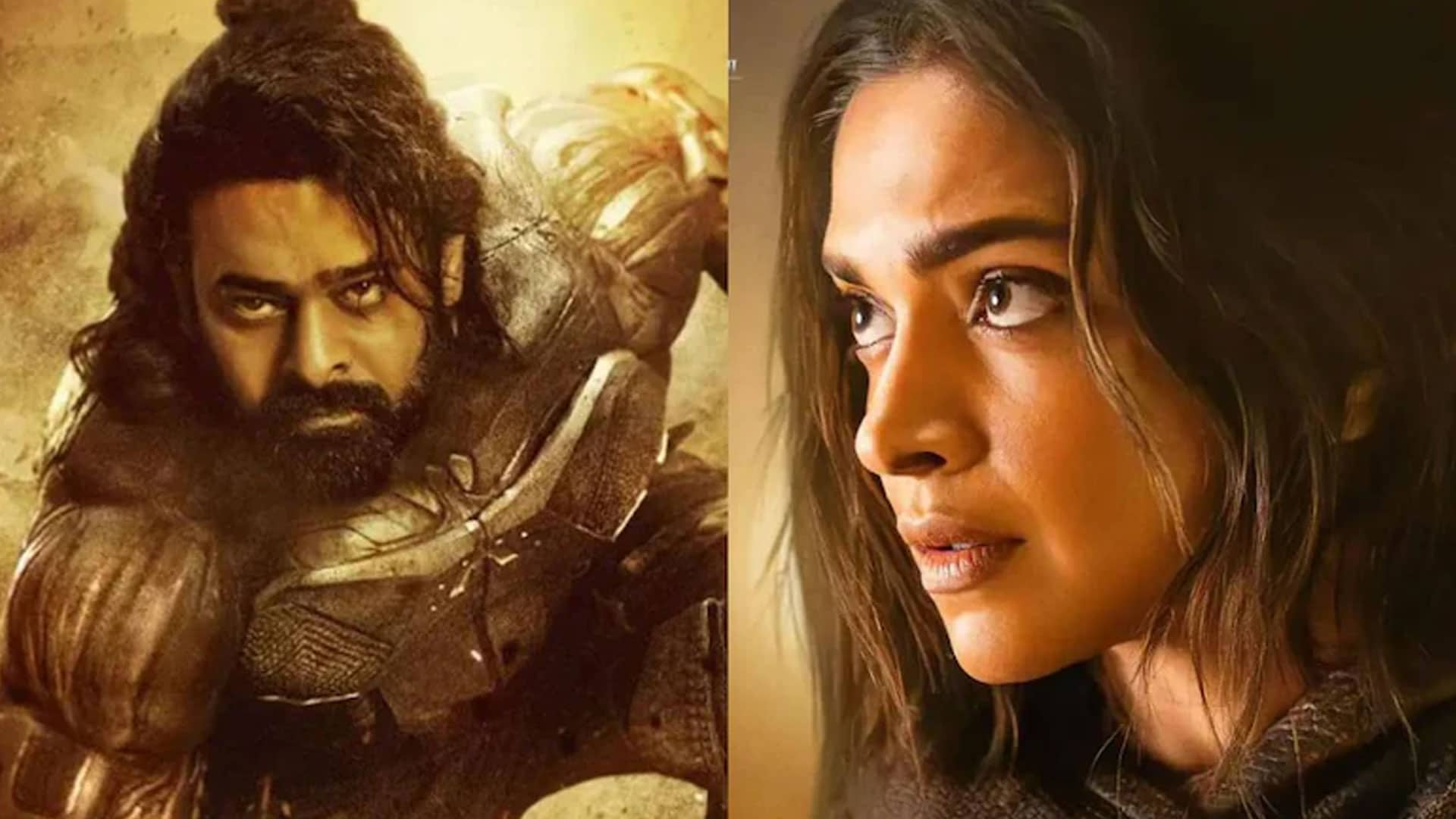home
videos
Shows
ndtv-special-ndtv-24x7-
Deepika Padukone In Conversation With Abhinav Bindra On Mental Health
Deepika Padukone In Conversation With Abhinav Bindra On Mental Health
On World Mental Health Day, a conversation on NDTV about mental health and well-being. Deepika Padukone talks to Abhinav Bindra about the need to open conversations about mental health, destigmatising mental health issues and how mental health is as critical as physical health.
Here's the full transcript:
Deepika Padukone: My childhood I was a brat, I was naughty, that's, that's my memory of my childhood. But yes, I think my initial years started with a lot of, it was very structured, it was very I'd like, I would think like most other homes, wake up in the morning, go to school, come back, friends, play downstairs. Both my sister and I were not into watching television or reading. For us it was more about going downstairs and playing, you know in the building with our friends, playing cricket, playing hide and seek. And then at some point in my life, I started playing professional badminton and I think that's when my life changed a little bit, because then as an athlete you know, you have a routine and you have training. So, my life started with 4:35 in the morning, you go for your first round of physical conditioning, come back. I didn't get permission from school to sort of go late, so I would finish my physical conditioning, come back home, quickly have a shower, have breakfast, run to school and just about make it in time for my first class. School would finish around 3:30-4, come back home, have a snack, again rush to the court, because this was the on-court session. Throw in a massive session for about a couple of hours, come back, do homework, have dinner, crash. That was literally my schedule from Monday to Friday and Saturdays was, I think catching up with homework, occasionally maybe going out. As a family we didn't really go out much. We hardly watch very many movies and even eating out was sort of very streamlined and maybe once in a week we'd go out to a restaurant. Yes, and that was my life until I was about 16 and then Board exams happened and then I realized that this is not what I wanted to do professionally and that modelling and acting was my calling and here I am now.
Abhinav Bindra: For me it was similar in many ways in terms of structure, it was very regimented, very structured. But I think there was one thing not similar, which was that as a young boy I hated sport. I was this fat little boy whose only talent in life was to miss physical education classes at school, I was in a boarding school and I hated it there, but I used to receive a letter from my father practically every day and it had one thing in common, which was to play sport. Of course, I didn't listen to him and I finally got out of boarding school and started going to a day school, that's where I got introduced to the sport of shooting. I was looking for just a pastime after school hours to do something and a family friend introduced me to the sport of shooting and I went to my first formal shooting session and I loved it, because to be successful in that sport I had to stand still and not really run around too much. But that was of course the entry into the sport. To do well I had to also make you know my weak point strength, but that's just the way it started. It was a normal childhood. I saw my parents work very hard so that was the environment I was brought up in. And then I used to look up to them, you know the amount of hard work they did in their professions that was something I learned from them. As I said I wasn't the most talented individual around, I was fat, I was uncoordinated, I was unathletic. I was not competitive at all but definitely I had one little talent which was to work hard and to persevere and that's what I did. I used to go to school, school got over, came home, quickly I had lunch and off I went for my shooting session, that lasted till five-six in the evening, come home, do your homework and go to bed. And repeat so that was my childhood.
Deepika Padukone: How did your father react to because you mentioned you weren't a very sporting athletic person and he'd write to you almost every single day asking you to pursue a sport. So, when your family friend introduced you to this and then he sort of saw the wheels churning and how did he react to that, was he happy or was it pressure?
Abhinav Bindra: He, my father was absolutely delighted because he came from a little bit of a sporting background, having played sport at the school level. My grandfather used to play hockey as well so he always wanted to see his child play some sort of sport, I think. Not just play small, just play sport for the sheer joy of playing sport. And there was no real target set at on day one that you know, you have to go to do this. Those were my decisions i had to make. And while my parents really supported me through my long journey, and you know they supported me materially to provide for me to get me the adequate training, but I believe their biggest contribution in my 20 odd years in sport was to of course support me morally. When I felt hopeless, they continued to see a lot of hope in me and those were many days in my career where this hopelessness was lingering around. And also, the greatest contribution, one of the greatest contributions they made was they gave me the space to make my own decisions and to make my own mistakes and that was critical. That was critical for my growth over a period of time. Even though there were times when they would have thought differently, they'd suggested something but never pushed me towards something. I had to own my successes and I had to own my failures and that was a great thing what they did. And you know, whenever parents come up to me and ask me how did your parents do what they do, I just tell them you have to support your kids, but you also have to give them the space to develop. Because you know when you're in an Olympic final or when that moment of truth comes in an environment where, which requires performance, one thing is certain and that is that you're going to be all alone and you have to find that courage and that conviction from deep within. And that is a process, it doesn't for some people, it may come naturally but for most it is a learning and it is a journey that you have to work your way through. I think that was the greatest contribution that my parents gave there, they always created an environment of great positivity. To be very honest I wasn't the most positive individual, around borderline negative, more realistic you know. I say that you know athletes, you know you're an actor and I say that the athletes are the best con men and con women that exist in the world because we have to con our minds every day in believing into the fact that we are the best.
I think you know I started as a 13-year-old boy and my first goal in my life is to win a district competition. I was the purest goal that I ever had and I achieved that and then of course there was a little bit of greed. Then you know I wanted to win the state championship and then the national championship. You know I represented India for my first Commonwealth Games at the age of 15 and I was competing at the Olympic Games in Sydney at the age of 17. But really it was my performance in Sydney which gave me a little bit of belief that hey, I can do this, I can go and win this thing and it was that performance...
Deepika Padukone: Would you say that so casually, you say that like I went into the Olympics I was 17, but was the journey actually that easy?
Abhinav Bindra: It was a lot of hard work. I mean right from a 13-year-old boy I had to make several sacrifices. Like I had no social life. I hardly had friends, because at least from school, because you know I would go to school and then right after that it was training, training, training. I packed my bag as the 13-year-old with my mother and left for Germany, and lived there for many years and many months to train in a little sports hostel, which was tough, in those days, because there was absolutely no communication and that we were not in the age of the internet and things like that so it was really difficult times. But it was something, just it was a calling. It was something which came from deep within my gut that this is what I want to do and I can do this. And one thing just led to the other quite organically early on and of course my parents pushed me to continue to study as well. And that was a great thing that they did was that I had to study. So, every time I travelled to competitions, two hours of the day were assigned to studies.
Deepika Padukone: And your school supported you...
Abhinav Bindra: I was very fortunate that my school was very, very supportive at a very young age. But very young, I mean this was very clear at age 15 I wanted to go to the Olympic Games and one day I wanted to become Olympic champion. That was, that clarity came in quite early on. It was a very lofty goal to have. I have to admit it was supremely ambitious. Some, many people thought I was mad and but that was okay. It was added motivation, it was fuelled and you know there were limiting factors. I was reminded of the fact that no Indian had ever won and we are not capable of winning gold medals at the Olympic Games but again I used that negativity and there was plenty of it around. I used it in a positive way to push me and I wanted to be the first one, so it was added motivation through it and of course the Sydney experience was a defining experience. And after that I moved to the United States, I lived and studied again. I was studying, doing my Bachelor's degree in business and I was living in the US Olympic training centre to train for the 2004 Olympic Games. I went there to the 2004 Olympic Games and perhaps it was my greatest failure, as in terms of an outcome.
You know I was somebody who was probably in the best shape of my life in 2004. I broke an Olympic record in 2004, entered the final in third place, but finished seventh and I had to shoot 10 very ordinary shots, but just happened to shoot the worst 10 shots of my life. And that was heart breaking and you know my world had come absolutely tumbling down. And another incredible story there. I met my mother five-ten minutes after this Olympic final, and it was one of the two Olympics my parents and my sister travelled to, and you know, she comes up to me and I was all grumpy and almost in tears and she comes up to me and says, you know the most you could have won today was bronzer or silver but you're going to win a gold medal. It's going to happen in four years' time. I just shut up and four years later it actually happened. So never argue with the mother's instinct, which is one of my biggest learnings as well. And then of course you know one thing led to the other. The Olympic Games in 2004 happened, that you know the Athens experience was a great failure, but it was a wonderful learning as well. Up until 2004 I was very, very driven by an outcome. I was obsessed by the outcome. I wanted this gold medal, and this experience just helped me detach from outcomes. For me the process became the goal. It was about doing my best every single day, it was about being better than what I was yesterday and I approached Beijing with a very different state of, in a very different state of mind. You know I didn't care if I won the gold medal or not. My goal was to live in the present moment. I had 70 opportunities where my competition was 70 shots, so I had 70 opportunities to be the best that I could be and that was my goal. You know for many years in my sports career up until here I always struggled with self-belief. You know I was always assailed by a lot of anxiety in this process and after Athens I gave up on this chase.
Deepika Padukone: My question was, my next question to you is going to be at what point did it become there's a point when you enjoy what you do, yes, and then there's a point when it starts becoming pressure and you don't even realize sometimes. So it's probably the Athens experience that made you realize that, yes?
Abhinav Bindra: I think it's all about balance as well. I think my best years as an athlete were when I was a student athlete because you know, I had a certain amount of hours to focus on my shooting and I had a certain amount of hours I had to study and do other things and that when that journey ended, I suddenly had more time and I started to put all my eggs in one basket. That was perhaps my biggest mistake in my sports career.
I did it. I happened to achieve my goal but I certainly did not achieve my full potential and now that I look back at my sports career, I think the greatest limiting factor was that I lost this balance. After 2004 yes, I won a gold medal but I believe that I could have done much better. I did achieve goals but definitely did not achieve my truest potential and that was because I put all my eggs in one basket. I lost balance and I did not prioritize my own human well-being. I did a lot of work. I put in a lot of effort to improve as an athlete and become better as an athlete, but I did not prioritize my own human well-being and if I had taken better care of my own self, I believe I would have come closer to achieving my truest potential.
Deepika Padukone: On the day when you won your medal and did you ever want to attempt doing it again? What was your sort of goal or target after that?
Abhinav Bindra: So, the moment I won my gold medal and I went back to my coach, my first sentence to my coach, and I don't know if many people even know about it, was that I'm never going to shoot again, it killed me so much to win that gold.
Deepika Padukone: You knew that instant?
Abhinav Bindra: Yes, that was my first reaction, because it took so much out of me. I mean it was so tough. I mean as I said we're good actors and you know everybody, the whole country thought I was this calm human being, but you don't know whatever was happening inside. I was close to death. I have never seen myself so alive with my heart pounding at almost 200 beats per minute and I was not even moving. I was and I was supposed to stand there still as death, so all that adrenaline, all that stress to perform in that moment was just draining. And yes, I think that moment was of course thrilling because a) I firstly did not even know that I had won, because for me the greatest victory was that I was able to do the best that I could do and that was to me personally the more, the most important thing. The gold medal or medal at the Olympics was secondary. So, it was a thrill to just have been able to shoot the 10 best shots of my life when it was needed the most. So that was the thrill but it was also very draining, my batteries were completely out and completely I was in the negative part of my Duracell battery, as I call it, and yes, I think of course the first day was a lot of thrill, you know winning brought in that extra adrenaline but from the next morning it was just tough.
I was just lost. I had this gold medal that I had chased for 16 years up until then in my pocket and I was just all dressed with nowhere to go. I was just lost. There was a great void that this victory created because my life was only oriented till that one moment. I know for so long in my life I had gone to bed with a dream that I want to win a gold medal at the Olympic Games, and every morning I would wake up, working to try and achieve that goal and suddenly you've got that. Now what? And it took a while. It took a long time to really understand myself and that's where, when I went to that Vipassana course, where I was, the goal was really to think of my next calling. I actually, when I went into Vipassana where I have to meditate, what 10 hours a day and wake up at 3 in the morning and start meditating. And all I did for 10 days of my personal course was think about shooting and how I could improve and that just gave me a realization that I just loved the process of what I did, which I probably did not really recognize in the process. But that experience just told me that I loved it and that realization was just enough to bring in that energy again and bringing that healing that was needed and that self-realization to happen, to find a goal again, to find direction again. And then suddenly I had it and then things became better, but it took a while. It took a good year and a half to really get out of it and get my balance back. You know a lot of athletes, including me, have been guilty and continue to be guilty in believing in an equation and that equation is that a gold medal equates happiness, yes. But in reality, we have to learn to reverse that equation and make happiness our gold medal and that was a process of learning as well.
You know the Beijing gold medal taught me something brutally, which was that okay, it was a great outcome, but it did not make me happier, and I started looking at life differently. I started also patting myself on the back a little bit on smaller achievements, on smaller goals that I set along the way, though that was very, very important part of that journey, prioritizing my self-care, to get enough rest and recovery. You know I kept abusing myself in many ways throughout my career and that was, you know, I disrespected my talent and that was because I gave it too much. You have to find that balance again you know, the secret to optimum performance or peak performance, as many people call it, is finding that.
Deepika Padukone: I wish my husband was here to listen to this.
Abhinav Bindra: It is a little bit like a relationship with your girlfriend I tell people, not too far but not too close. The definition of success kept changing through the course of my journey. As a young boy success was meant that I would get famous, it was a way to create an identity of my own, but it was also about this whole thing about fame. But you know in sport you're going to fail much more than you succeed and after a couple of failures came my way, I soon realized that this is not going to work and I'm not, that's not going to be my definition of success. Now that I have exited my investment of thoughts and can look back at my career a little bit more dispassionately, you know, I look back at success, at the relationships that I was able to build through the course of my career. I look at the whole journey as a success on its own. It is not the gold medal which was the process, which was the success, it is the process what that gold medal made me as a human being, as an individual, the values that I could imbibe through sport. Of course, it taught me how to win, but more importantly sport taught me how to lose. You know it taught me how to work hard, it taught me how to have a goal, it taught me, you know, how to deal with conflict, how to deal with people who are light, who I did not dislike, but it was the greatest learning of life. And that to me, as I look back, was the greatest success of those 22 years. Of course, there were outcomes, but the outcomes are on a wall, my medals are hanging on a wall, but all these learnings that I had through sport and the values that I could imbibe through sport will stay with me forever. And that for me has been my greatest, greatest success and all what I do in life post my sport career will always be, you know, driven through those values and that I imbibed on the field of play.
Deepika Padukone: Gosh, I feel like I'm stealing words from my mom, but I say this all the time that I know I'm an actor by profession, but I think like an athlete and I feel, like when you play sport it changes your life forever, it could be, you know you could have played just recreationally, you could have played sport professionally, but what you learn in those years I don't think anything else in life really teaches you that. And exactly like he said, it's taught me how to handle success, it's taught me how to handle failure. And I don't think I'd be able to do what I do today if I hadn't had all of those experiences. And what does success mean to me at that age, like he said, at that age you want to be famous, you want to be interviewed, you want to see, you know, your pictures flashed everywhere, you want money, you want to be financially independent in a different way, you know, and you hear of names in various fields of successful people and you aspire to be that. And then, as you go on that journey, you realize that success means different things to different people and you know today for me success is to be able to be present.
Abhinav Bindra: I think it's absolutely, it's not a sign of a weakness at all to seek help. It's actually very, very empowering. I experienced it myself and I would just encourage each and everybody who is not feeling their best to go out and seek help. I think it's a real sign of courage and it's a real strain of strength. If you think an athlete's life will be devoid of pressure then you're living in a dream. There will be pressure, there will be stress, but how do you learn to channelize it? I had to work my way through a few therapists and just find that way and that harmony and strike that relationship with somebody who I started to trust. That was a process and when I found that, that was again something which was incredibly empowering for me to just have to be able to bear myself naked in in front of my therapist and talk about my vulnerabilities. And when I was, you know, initially I thought it was limiting, but when I started doing it, it was actually very empowering. I felt much stronger when I came out of a session.
Deepika Padukone: You start discovering different facets of yourself as well, absolutely, while you're on this journey and...
Abhinav Bindra: Absolutely and another very incredible thing happened in that process was, you know I'm called to many places to speak, and all I go and talk about is my vulnerabilities and I see people now really resonating with it, because you know, they can relate to some parts of it. You know who cares if I did so many sit-ups or did so much core training to become more stable to reduce my heart rate or get my respiratory rate lower, it was great but it won a gold medal, but how does it help them. So I really go and talk about my vulnerabilities. And I'd like to talk about my greatest vulnerabilities with belief, because I had become so obsessive and I was a perfectionist of sorts and chasing perfection is a good thing, but it's also a really bad thing because choosing perfection is like chasing any untameable beast. I mean it's just ridiculous and you know I never gained confidence. You know I would shoot perfect scores, break world records in practice, but my reaction out of breaking a world record was but I could have done that a little bit better. So, I gained absolutely no confidence and it was just tough. It just brought in so much anxiety and I was never happy. I was never happy with what I was, what I was doing and it was, that was toxic. But there was a shift and that was limiting in performance as well, right. I used to be so scared going into competition you know, I was always a little chicken-hearted but this even made it worse, but there was a shift and the decisive shift was when I stopped chasing self-belief and I started chasing self-respect and for me the most important thing was to be the best that I could be when nobody was watching, when there were no lights and cameras on me. But I woke up every morning with the same enthusiasm and energy as I would when competing in an Olympic final and that was just a wonderful journey which was so empowering. I would look at myself into the mirror every night and ask myself the question, have I given it my best today? And when the answer was yes, I always had a very good night's sleep. And I realized that hard work is the best possible sedative that you can ever get. And I tried a few, I have to admit, over the course of my career, but hard work was the best sedative that you could get. And you know, for example, when I embarked on my Beijing Olympic adventure, you know, I looked at myself into the mirror a couple of days before I took my flight to Beijing and asked myself, have I given it my best in the last four years to be the best that I could be? And frankly, the answer was yes. I could have done humanly nothing more to prepare for this event and even before I shot the first shot at the Beijing Olympics, I was already a winner. I was a winner in my own eyes and that was so empowering, that gave me a sense of security from deep within and that was that wonderful journey that I started to chase of self-respect and for me it's much better than self-belief.
Deepika Padukone: I mean I think for me, we've in the last say 10-15 years India's seen an almost sort of a revolution when it comes to physical health, but somehow, we never give the same kind of importance to our emotional well-being. And therefore, I think, that there's absolutely no shame or stigma in that we've both had our experiences and it's okay to not be okay. It's okay to talk about it. I think for me one of the biggest I'd say, my journey to recovery, really was to accept that there is such a thing as mental illness. So, I think accepting it for myself number one. Two to be able to share my journey with the world, with my family, with my friends and with the world and also to seek help. I think there's no shame or stigma in that. We do take care of our physical selves. The minute we're unwell you know, we never think twice about speaking to a doctor or getting medical advice, so there's no reason why we shouldn't do that for our mind as well you know. So, I think you need your mind as much as you need your body and I think both of these things are extremely important and work hand in hand.
Abhinav Bindra: You know I talked a lot about the challenges of elite sport and the challenges that elite sport potentially can have on mental health, but I haven't done a good job of talking about the positive role that sport can play in the role of mental health of society. And there I feel we're a very young country, a very young society and we have to imbibe the values of sport you know. Mental health and your values are so closely linked. You spoke so well about the role that your parents played in your upbringing, which helped you deal with challenges and that is exactly what sport can play, a very meaningful role in in nation building. You know sport teaches you how to win, it teaches you how to lose, it teaches you honesty, teaches you integrity, teaches you how to have a goal, it teaches you to listen. We're all, we're a young country which has very short attention spans at this moment and again very closely linked to mental health, so sport can be a great driver for positive work on mental health. So, I really love that sport plays a more meaningful role in our young society to imbibe these values that are so important in life. You know we're all after economic success and you know economic superiority and we talk about a five trillion-dollar economy and it's very interesting, because you know all the global economic superpowers are also great sporting superpowers. And I do believe that sport has had a very, very meaningful role in all these great leaders and businessmen in their careers because they've all experienced sport, they've played sport as young kids and they've imbibed certain values which they've taken through in their life.
So, I do believe that we should use the power of sport of course for the physical health benefits that sport gives, but also for the mental well-being of society in general. Of course, this is something that I'm very passionate about and you know I had my own experiences with mental health and I wanted to use the opportunity that I have now to help other athletes, to set them at least on the right path or to at least help destigmatize the whole issue regarding mental health. And then I had the opportunity to work with the International Olympic Committee and part of their athletes' commission and part of the working group on athlete mental health and we've done quite a lot of good work in the last couple of years to start to destigmatize mental health, also, to create resources. You know athletes are assessed every year physically but there's never been an assessment tool to assess athletes on their mental health. So, we actually sat down for two years and built an assessed creditable medical assessment tool to assess mental health of athletes. So now that is being used by many sports organizations across the world. We also have to build the ecosystem that surrounds the athlete, so we started a certification and diploma course specifically on athlete mental health to sanitize the whole entourage that surrounds the athlete. On mental health we've released a toolkit as well, so that's the work of the IOC that I've dedicated a lot of time and energy into and it is very, very gratifying. Of course, through the foundation, my own foundation in India, we're trying to create psychologically safe environments, working with a lot of organizations, state governments, coaches. You know they're the real, it's not just about the mental health of athletes, it's a lot to do with the mental health of coaches as well. They too need to be happy individuals personally to be, to foster positive environments. So, we're making our humble, I'm making my humble attempt and again it's, it remains a passion. It's very gratifying to be able to give back in a little way and hopefully it helps.
Anisha Padukone: That's a perfect way to end this fascinating conversation. Special, special thanks to you Abhinav for accepting our invitation and speaking so passionately and honestly about your journey. It offered us a new perspective to measure success and reinforce the importance of well-being. Thank you Deepika for your presence, participation and constant drive to make a greater contribution and thank you to our audience. Your support is heart-warming. Goodbye and see you at our next lecture.
Here's the full transcript:
Deepika Padukone: My childhood I was a brat, I was naughty, that's, that's my memory of my childhood. But yes, I think my initial years started with a lot of, it was very structured, it was very I'd like, I would think like most other homes, wake up in the morning, go to school, come back, friends, play downstairs. Both my sister and I were not into watching television or reading. For us it was more about going downstairs and playing, you know in the building with our friends, playing cricket, playing hide and seek. And then at some point in my life, I started playing professional badminton and I think that's when my life changed a little bit, because then as an athlete you know, you have a routine and you have training. So, my life started with 4:35 in the morning, you go for your first round of physical conditioning, come back. I didn't get permission from school to sort of go late, so I would finish my physical conditioning, come back home, quickly have a shower, have breakfast, run to school and just about make it in time for my first class. School would finish around 3:30-4, come back home, have a snack, again rush to the court, because this was the on-court session. Throw in a massive session for about a couple of hours, come back, do homework, have dinner, crash. That was literally my schedule from Monday to Friday and Saturdays was, I think catching up with homework, occasionally maybe going out. As a family we didn't really go out much. We hardly watch very many movies and even eating out was sort of very streamlined and maybe once in a week we'd go out to a restaurant. Yes, and that was my life until I was about 16 and then Board exams happened and then I realized that this is not what I wanted to do professionally and that modelling and acting was my calling and here I am now.
Abhinav Bindra: For me it was similar in many ways in terms of structure, it was very regimented, very structured. But I think there was one thing not similar, which was that as a young boy I hated sport. I was this fat little boy whose only talent in life was to miss physical education classes at school, I was in a boarding school and I hated it there, but I used to receive a letter from my father practically every day and it had one thing in common, which was to play sport. Of course, I didn't listen to him and I finally got out of boarding school and started going to a day school, that's where I got introduced to the sport of shooting. I was looking for just a pastime after school hours to do something and a family friend introduced me to the sport of shooting and I went to my first formal shooting session and I loved it, because to be successful in that sport I had to stand still and not really run around too much. But that was of course the entry into the sport. To do well I had to also make you know my weak point strength, but that's just the way it started. It was a normal childhood. I saw my parents work very hard so that was the environment I was brought up in. And then I used to look up to them, you know the amount of hard work they did in their professions that was something I learned from them. As I said I wasn't the most talented individual around, I was fat, I was uncoordinated, I was unathletic. I was not competitive at all but definitely I had one little talent which was to work hard and to persevere and that's what I did. I used to go to school, school got over, came home, quickly I had lunch and off I went for my shooting session, that lasted till five-six in the evening, come home, do your homework and go to bed. And repeat so that was my childhood.
Deepika Padukone: How did your father react to because you mentioned you weren't a very sporting athletic person and he'd write to you almost every single day asking you to pursue a sport. So, when your family friend introduced you to this and then he sort of saw the wheels churning and how did he react to that, was he happy or was it pressure?
Abhinav Bindra: He, my father was absolutely delighted because he came from a little bit of a sporting background, having played sport at the school level. My grandfather used to play hockey as well so he always wanted to see his child play some sort of sport, I think. Not just play small, just play sport for the sheer joy of playing sport. And there was no real target set at on day one that you know, you have to go to do this. Those were my decisions i had to make. And while my parents really supported me through my long journey, and you know they supported me materially to provide for me to get me the adequate training, but I believe their biggest contribution in my 20 odd years in sport was to of course support me morally. When I felt hopeless, they continued to see a lot of hope in me and those were many days in my career where this hopelessness was lingering around. And also, the greatest contribution, one of the greatest contributions they made was they gave me the space to make my own decisions and to make my own mistakes and that was critical. That was critical for my growth over a period of time. Even though there were times when they would have thought differently, they'd suggested something but never pushed me towards something. I had to own my successes and I had to own my failures and that was a great thing what they did. And you know, whenever parents come up to me and ask me how did your parents do what they do, I just tell them you have to support your kids, but you also have to give them the space to develop. Because you know when you're in an Olympic final or when that moment of truth comes in an environment where, which requires performance, one thing is certain and that is that you're going to be all alone and you have to find that courage and that conviction from deep within. And that is a process, it doesn't for some people, it may come naturally but for most it is a learning and it is a journey that you have to work your way through. I think that was the greatest contribution that my parents gave there, they always created an environment of great positivity. To be very honest I wasn't the most positive individual, around borderline negative, more realistic you know. I say that you know athletes, you know you're an actor and I say that the athletes are the best con men and con women that exist in the world because we have to con our minds every day in believing into the fact that we are the best.
I think you know I started as a 13-year-old boy and my first goal in my life is to win a district competition. I was the purest goal that I ever had and I achieved that and then of course there was a little bit of greed. Then you know I wanted to win the state championship and then the national championship. You know I represented India for my first Commonwealth Games at the age of 15 and I was competing at the Olympic Games in Sydney at the age of 17. But really it was my performance in Sydney which gave me a little bit of belief that hey, I can do this, I can go and win this thing and it was that performance...
Deepika Padukone: Would you say that so casually, you say that like I went into the Olympics I was 17, but was the journey actually that easy?
Abhinav Bindra: It was a lot of hard work. I mean right from a 13-year-old boy I had to make several sacrifices. Like I had no social life. I hardly had friends, because at least from school, because you know I would go to school and then right after that it was training, training, training. I packed my bag as the 13-year-old with my mother and left for Germany, and lived there for many years and many months to train in a little sports hostel, which was tough, in those days, because there was absolutely no communication and that we were not in the age of the internet and things like that so it was really difficult times. But it was something, just it was a calling. It was something which came from deep within my gut that this is what I want to do and I can do this. And one thing just led to the other quite organically early on and of course my parents pushed me to continue to study as well. And that was a great thing that they did was that I had to study. So, every time I travelled to competitions, two hours of the day were assigned to studies.
Deepika Padukone: And your school supported you...
Abhinav Bindra: I was very fortunate that my school was very, very supportive at a very young age. But very young, I mean this was very clear at age 15 I wanted to go to the Olympic Games and one day I wanted to become Olympic champion. That was, that clarity came in quite early on. It was a very lofty goal to have. I have to admit it was supremely ambitious. Some, many people thought I was mad and but that was okay. It was added motivation, it was fuelled and you know there were limiting factors. I was reminded of the fact that no Indian had ever won and we are not capable of winning gold medals at the Olympic Games but again I used that negativity and there was plenty of it around. I used it in a positive way to push me and I wanted to be the first one, so it was added motivation through it and of course the Sydney experience was a defining experience. And after that I moved to the United States, I lived and studied again. I was studying, doing my Bachelor's degree in business and I was living in the US Olympic training centre to train for the 2004 Olympic Games. I went there to the 2004 Olympic Games and perhaps it was my greatest failure, as in terms of an outcome.
You know I was somebody who was probably in the best shape of my life in 2004. I broke an Olympic record in 2004, entered the final in third place, but finished seventh and I had to shoot 10 very ordinary shots, but just happened to shoot the worst 10 shots of my life. And that was heart breaking and you know my world had come absolutely tumbling down. And another incredible story there. I met my mother five-ten minutes after this Olympic final, and it was one of the two Olympics my parents and my sister travelled to, and you know, she comes up to me and I was all grumpy and almost in tears and she comes up to me and says, you know the most you could have won today was bronzer or silver but you're going to win a gold medal. It's going to happen in four years' time. I just shut up and four years later it actually happened. So never argue with the mother's instinct, which is one of my biggest learnings as well. And then of course you know one thing led to the other. The Olympic Games in 2004 happened, that you know the Athens experience was a great failure, but it was a wonderful learning as well. Up until 2004 I was very, very driven by an outcome. I was obsessed by the outcome. I wanted this gold medal, and this experience just helped me detach from outcomes. For me the process became the goal. It was about doing my best every single day, it was about being better than what I was yesterday and I approached Beijing with a very different state of, in a very different state of mind. You know I didn't care if I won the gold medal or not. My goal was to live in the present moment. I had 70 opportunities where my competition was 70 shots, so I had 70 opportunities to be the best that I could be and that was my goal. You know for many years in my sports career up until here I always struggled with self-belief. You know I was always assailed by a lot of anxiety in this process and after Athens I gave up on this chase.
Deepika Padukone: My question was, my next question to you is going to be at what point did it become there's a point when you enjoy what you do, yes, and then there's a point when it starts becoming pressure and you don't even realize sometimes. So it's probably the Athens experience that made you realize that, yes?
Abhinav Bindra: I think it's all about balance as well. I think my best years as an athlete were when I was a student athlete because you know, I had a certain amount of hours to focus on my shooting and I had a certain amount of hours I had to study and do other things and that when that journey ended, I suddenly had more time and I started to put all my eggs in one basket. That was perhaps my biggest mistake in my sports career.
I did it. I happened to achieve my goal but I certainly did not achieve my full potential and now that I look back at my sports career, I think the greatest limiting factor was that I lost this balance. After 2004 yes, I won a gold medal but I believe that I could have done much better. I did achieve goals but definitely did not achieve my truest potential and that was because I put all my eggs in one basket. I lost balance and I did not prioritize my own human well-being. I did a lot of work. I put in a lot of effort to improve as an athlete and become better as an athlete, but I did not prioritize my own human well-being and if I had taken better care of my own self, I believe I would have come closer to achieving my truest potential.
Deepika Padukone: On the day when you won your medal and did you ever want to attempt doing it again? What was your sort of goal or target after that?
Abhinav Bindra: So, the moment I won my gold medal and I went back to my coach, my first sentence to my coach, and I don't know if many people even know about it, was that I'm never going to shoot again, it killed me so much to win that gold.
Deepika Padukone: You knew that instant?
Abhinav Bindra: Yes, that was my first reaction, because it took so much out of me. I mean it was so tough. I mean as I said we're good actors and you know everybody, the whole country thought I was this calm human being, but you don't know whatever was happening inside. I was close to death. I have never seen myself so alive with my heart pounding at almost 200 beats per minute and I was not even moving. I was and I was supposed to stand there still as death, so all that adrenaline, all that stress to perform in that moment was just draining. And yes, I think that moment was of course thrilling because a) I firstly did not even know that I had won, because for me the greatest victory was that I was able to do the best that I could do and that was to me personally the more, the most important thing. The gold medal or medal at the Olympics was secondary. So, it was a thrill to just have been able to shoot the 10 best shots of my life when it was needed the most. So that was the thrill but it was also very draining, my batteries were completely out and completely I was in the negative part of my Duracell battery, as I call it, and yes, I think of course the first day was a lot of thrill, you know winning brought in that extra adrenaline but from the next morning it was just tough.
I was just lost. I had this gold medal that I had chased for 16 years up until then in my pocket and I was just all dressed with nowhere to go. I was just lost. There was a great void that this victory created because my life was only oriented till that one moment. I know for so long in my life I had gone to bed with a dream that I want to win a gold medal at the Olympic Games, and every morning I would wake up, working to try and achieve that goal and suddenly you've got that. Now what? And it took a while. It took a long time to really understand myself and that's where, when I went to that Vipassana course, where I was, the goal was really to think of my next calling. I actually, when I went into Vipassana where I have to meditate, what 10 hours a day and wake up at 3 in the morning and start meditating. And all I did for 10 days of my personal course was think about shooting and how I could improve and that just gave me a realization that I just loved the process of what I did, which I probably did not really recognize in the process. But that experience just told me that I loved it and that realization was just enough to bring in that energy again and bringing that healing that was needed and that self-realization to happen, to find a goal again, to find direction again. And then suddenly I had it and then things became better, but it took a while. It took a good year and a half to really get out of it and get my balance back. You know a lot of athletes, including me, have been guilty and continue to be guilty in believing in an equation and that equation is that a gold medal equates happiness, yes. But in reality, we have to learn to reverse that equation and make happiness our gold medal and that was a process of learning as well.
You know the Beijing gold medal taught me something brutally, which was that okay, it was a great outcome, but it did not make me happier, and I started looking at life differently. I started also patting myself on the back a little bit on smaller achievements, on smaller goals that I set along the way, though that was very, very important part of that journey, prioritizing my self-care, to get enough rest and recovery. You know I kept abusing myself in many ways throughout my career and that was, you know, I disrespected my talent and that was because I gave it too much. You have to find that balance again you know, the secret to optimum performance or peak performance, as many people call it, is finding that.
Deepika Padukone: I wish my husband was here to listen to this.
Abhinav Bindra: It is a little bit like a relationship with your girlfriend I tell people, not too far but not too close. The definition of success kept changing through the course of my journey. As a young boy success was meant that I would get famous, it was a way to create an identity of my own, but it was also about this whole thing about fame. But you know in sport you're going to fail much more than you succeed and after a couple of failures came my way, I soon realized that this is not going to work and I'm not, that's not going to be my definition of success. Now that I have exited my investment of thoughts and can look back at my career a little bit more dispassionately, you know, I look back at success, at the relationships that I was able to build through the course of my career. I look at the whole journey as a success on its own. It is not the gold medal which was the process, which was the success, it is the process what that gold medal made me as a human being, as an individual, the values that I could imbibe through sport. Of course, it taught me how to win, but more importantly sport taught me how to lose. You know it taught me how to work hard, it taught me how to have a goal, it taught me, you know, how to deal with conflict, how to deal with people who are light, who I did not dislike, but it was the greatest learning of life. And that to me, as I look back, was the greatest success of those 22 years. Of course, there were outcomes, but the outcomes are on a wall, my medals are hanging on a wall, but all these learnings that I had through sport and the values that I could imbibe through sport will stay with me forever. And that for me has been my greatest, greatest success and all what I do in life post my sport career will always be, you know, driven through those values and that I imbibed on the field of play.
Deepika Padukone: Gosh, I feel like I'm stealing words from my mom, but I say this all the time that I know I'm an actor by profession, but I think like an athlete and I feel, like when you play sport it changes your life forever, it could be, you know you could have played just recreationally, you could have played sport professionally, but what you learn in those years I don't think anything else in life really teaches you that. And exactly like he said, it's taught me how to handle success, it's taught me how to handle failure. And I don't think I'd be able to do what I do today if I hadn't had all of those experiences. And what does success mean to me at that age, like he said, at that age you want to be famous, you want to be interviewed, you want to see, you know, your pictures flashed everywhere, you want money, you want to be financially independent in a different way, you know, and you hear of names in various fields of successful people and you aspire to be that. And then, as you go on that journey, you realize that success means different things to different people and you know today for me success is to be able to be present.
Abhinav Bindra: I think it's absolutely, it's not a sign of a weakness at all to seek help. It's actually very, very empowering. I experienced it myself and I would just encourage each and everybody who is not feeling their best to go out and seek help. I think it's a real sign of courage and it's a real strain of strength. If you think an athlete's life will be devoid of pressure then you're living in a dream. There will be pressure, there will be stress, but how do you learn to channelize it? I had to work my way through a few therapists and just find that way and that harmony and strike that relationship with somebody who I started to trust. That was a process and when I found that, that was again something which was incredibly empowering for me to just have to be able to bear myself naked in in front of my therapist and talk about my vulnerabilities. And when I was, you know, initially I thought it was limiting, but when I started doing it, it was actually very empowering. I felt much stronger when I came out of a session.
Deepika Padukone: You start discovering different facets of yourself as well, absolutely, while you're on this journey and...
Abhinav Bindra: Absolutely and another very incredible thing happened in that process was, you know I'm called to many places to speak, and all I go and talk about is my vulnerabilities and I see people now really resonating with it, because you know, they can relate to some parts of it. You know who cares if I did so many sit-ups or did so much core training to become more stable to reduce my heart rate or get my respiratory rate lower, it was great but it won a gold medal, but how does it help them. So I really go and talk about my vulnerabilities. And I'd like to talk about my greatest vulnerabilities with belief, because I had become so obsessive and I was a perfectionist of sorts and chasing perfection is a good thing, but it's also a really bad thing because choosing perfection is like chasing any untameable beast. I mean it's just ridiculous and you know I never gained confidence. You know I would shoot perfect scores, break world records in practice, but my reaction out of breaking a world record was but I could have done that a little bit better. So, I gained absolutely no confidence and it was just tough. It just brought in so much anxiety and I was never happy. I was never happy with what I was, what I was doing and it was, that was toxic. But there was a shift and that was limiting in performance as well, right. I used to be so scared going into competition you know, I was always a little chicken-hearted but this even made it worse, but there was a shift and the decisive shift was when I stopped chasing self-belief and I started chasing self-respect and for me the most important thing was to be the best that I could be when nobody was watching, when there were no lights and cameras on me. But I woke up every morning with the same enthusiasm and energy as I would when competing in an Olympic final and that was just a wonderful journey which was so empowering. I would look at myself into the mirror every night and ask myself the question, have I given it my best today? And when the answer was yes, I always had a very good night's sleep. And I realized that hard work is the best possible sedative that you can ever get. And I tried a few, I have to admit, over the course of my career, but hard work was the best sedative that you could get. And you know, for example, when I embarked on my Beijing Olympic adventure, you know, I looked at myself into the mirror a couple of days before I took my flight to Beijing and asked myself, have I given it my best in the last four years to be the best that I could be? And frankly, the answer was yes. I could have done humanly nothing more to prepare for this event and even before I shot the first shot at the Beijing Olympics, I was already a winner. I was a winner in my own eyes and that was so empowering, that gave me a sense of security from deep within and that was that wonderful journey that I started to chase of self-respect and for me it's much better than self-belief.
Deepika Padukone: I mean I think for me, we've in the last say 10-15 years India's seen an almost sort of a revolution when it comes to physical health, but somehow, we never give the same kind of importance to our emotional well-being. And therefore, I think, that there's absolutely no shame or stigma in that we've both had our experiences and it's okay to not be okay. It's okay to talk about it. I think for me one of the biggest I'd say, my journey to recovery, really was to accept that there is such a thing as mental illness. So, I think accepting it for myself number one. Two to be able to share my journey with the world, with my family, with my friends and with the world and also to seek help. I think there's no shame or stigma in that. We do take care of our physical selves. The minute we're unwell you know, we never think twice about speaking to a doctor or getting medical advice, so there's no reason why we shouldn't do that for our mind as well you know. So, I think you need your mind as much as you need your body and I think both of these things are extremely important and work hand in hand.
Abhinav Bindra: You know I talked a lot about the challenges of elite sport and the challenges that elite sport potentially can have on mental health, but I haven't done a good job of talking about the positive role that sport can play in the role of mental health of society. And there I feel we're a very young country, a very young society and we have to imbibe the values of sport you know. Mental health and your values are so closely linked. You spoke so well about the role that your parents played in your upbringing, which helped you deal with challenges and that is exactly what sport can play, a very meaningful role in in nation building. You know sport teaches you how to win, it teaches you how to lose, it teaches you honesty, teaches you integrity, teaches you how to have a goal, it teaches you to listen. We're all, we're a young country which has very short attention spans at this moment and again very closely linked to mental health, so sport can be a great driver for positive work on mental health. So, I really love that sport plays a more meaningful role in our young society to imbibe these values that are so important in life. You know we're all after economic success and you know economic superiority and we talk about a five trillion-dollar economy and it's very interesting, because you know all the global economic superpowers are also great sporting superpowers. And I do believe that sport has had a very, very meaningful role in all these great leaders and businessmen in their careers because they've all experienced sport, they've played sport as young kids and they've imbibed certain values which they've taken through in their life.
So, I do believe that we should use the power of sport of course for the physical health benefits that sport gives, but also for the mental well-being of society in general. Of course, this is something that I'm very passionate about and you know I had my own experiences with mental health and I wanted to use the opportunity that I have now to help other athletes, to set them at least on the right path or to at least help destigmatize the whole issue regarding mental health. And then I had the opportunity to work with the International Olympic Committee and part of their athletes' commission and part of the working group on athlete mental health and we've done quite a lot of good work in the last couple of years to start to destigmatize mental health, also, to create resources. You know athletes are assessed every year physically but there's never been an assessment tool to assess athletes on their mental health. So, we actually sat down for two years and built an assessed creditable medical assessment tool to assess mental health of athletes. So now that is being used by many sports organizations across the world. We also have to build the ecosystem that surrounds the athlete, so we started a certification and diploma course specifically on athlete mental health to sanitize the whole entourage that surrounds the athlete. On mental health we've released a toolkit as well, so that's the work of the IOC that I've dedicated a lot of time and energy into and it is very, very gratifying. Of course, through the foundation, my own foundation in India, we're trying to create psychologically safe environments, working with a lot of organizations, state governments, coaches. You know they're the real, it's not just about the mental health of athletes, it's a lot to do with the mental health of coaches as well. They too need to be happy individuals personally to be, to foster positive environments. So, we're making our humble, I'm making my humble attempt and again it's, it remains a passion. It's very gratifying to be able to give back in a little way and hopefully it helps.
Anisha Padukone: That's a perfect way to end this fascinating conversation. Special, special thanks to you Abhinav for accepting our invitation and speaking so passionately and honestly about your journey. It offered us a new perspective to measure success and reinforce the importance of well-being. Thank you Deepika for your presence, participation and constant drive to make a greater contribution and thank you to our audience. Your support is heart-warming. Goodbye and see you at our next lecture.
